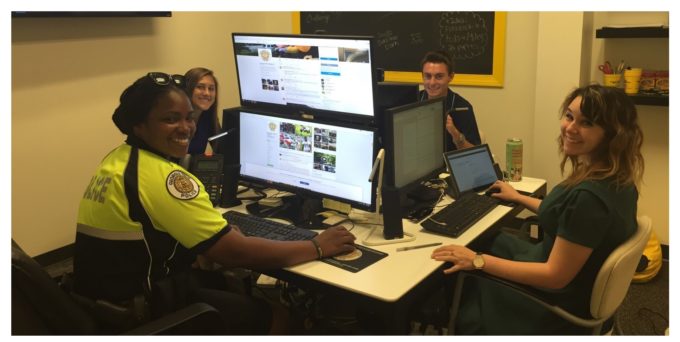Reflections on The SMILE Conference
Social Media the Internet and Law Enforcement, Chicago, May 9,10,11 2011
How often do you attend a conference which fills you with enthusiasm; perhaps it might give you a ‘feel good’ factor, but it changes nothing you actually do when you get back to work?
Well, I’m pleased to say that my experience as a presenter attending my first SMILE conference has genuinely expanded my knowledge and understanding of social media and its positive application to policing.
In my role as the UK Policing lead for social media I have the ability to influence national thinking on the subject. I will use the learning from The SMILE Conference to highlight key issues as a speaker, for example at both Association of Chief Police Officers in Scotland spring conference and the Association of Chief Police Officers in England/Wales summer conference, and generally through interviews, articles, blogs and my ACPO/S business area.
Themes
I have given the conference a great deal of thought and began writing this blog on the overnight flight back to London. I felt that the conference had drawn out a number of themes, (I’m not sure if this was intentional or that other participants would agree with my thoughts), which I thought were worth sharing:
1. The Generational Gap
What came through in the early part of the conference was evidence of a clear generational divide. This was not just in terms of the use and understanding of technology, but in attitudes to privacy. What does this mean for policing?
Current attitudes are reflected in the stance which some professional standards departments take; namely that social media is bad and incompatible with being a police officer/police staff member. Whilst I can accept some foundation for this view, younger officers and those described as ‘digital natives’ do not recognize it. For them, ‘privacy’ means something different from what it would to a more traditional police officer who did not grow up in the digital age. They are totally comfortable with social media and their appetite for sharing personal information with others is quite different from the non-digital generation.
The conclusion I came to was this….officers who are technically competent and understand the way social media tools can enhance policing are an asset to be utilized. Strategic leaders need to accept that the learning in this field will come from the bottom up, namely we will have to learn new skills from more junior officers.
Equally, experienced ‘non digital’ officers, lacking in social media skills, can help the ‘digital natives’ understand the risks around privacy and the consequences of revealing too much personal information on officer safety and organizational reputation. We can help them see where the line needs to be drawn.
2. Convergence of social media and policing skills
Some people are doing great stuff around social media in policing. They are using multiple social media platforms to communicate with the public and understand how the technical capability of hardware and applications can be used to best effect in a policing context.
Convergence is apparent in the breadth of use of social media in policing. We saw great examples in community policing; crime prevention; Crime Stoppers; gang prevention and crime detection through the use of open source information and forensic examination of web based material.
Constable Scott Mills from Toronto Police excelled in his presentation on the use of tools such as Twitter, Facebook and Foursquare to engage with night time economy participants. Here the effectiveness came from being physically present on the street at the same time as using social media tools. He demonstrated the power of blending physical public engagement and community reassurance with real time virtual public engagement. Using social media in this way to compliment traditional policing methods simultaneously is a very efficient and cost effective method of increasing visibility with the public.
Convergence then, for me, is not just about the widening scope of social media across traditional areas of policing, but how we blend an understanding and application of social media skills with an understanding and application of policing skills.
3. Public first for information
Social media is a game changer for how we deal with managing media related information. Captain Mike Parker, LA County Sheriff Dept, reinforced the need for the police to revise its traditional approach to media relations from one of giving everything to the press first to one of making information public through ‘news releases’.
The changing nature of news, driven by digital and social media, requires the police to be more proactive, speaking directly to the public rather than being filtered through traditional news media. His department now place ‘news’ in one place on their web site, rather than the press having access to information before the public. Mike agrees that there are challenges with this approach, but he gave clear examples of still being able to work with the press for a win/win outcome. He firmly believes that there is just too much going on now to have separate channels for media relations and the need to connect video, Twitter, Facebook and the web site is clear.
Mike reinforced the need to be on the front foot particularly in forces generating their own content for posting on their web site and with positive messages to the public. He stressed that this was crucial during periods of negative publicity, when the media might choose to present a partial story to the public. The ability of the police to present a more balanced view directly to the public, (by perhaps making available additional video material), has become more important due to the increased availability of publicly generated on line video content.
Mike did point out 2 key risks. Firstly, the police have never been good at providing timely information and we must improve in this area if we are to remain a credible source of information. The public are already turning to social media for up to date information and we must be able to respond to this challenge to remain relevant and credible. Secondly, our information must be accurate. If we are communicating directly to the public we will not have news editors tidying up our sloppy work!
Lastly on this, Mike ran through his 11 C’s of media. They have been heavily tweeted so I will not repeat them here but have a look here.
4. There is no Privacy
How topical given the privacy debate currently ongoing in the UK involving super injunctions and the role of social media in undermining the law!
Dave Marcus from McAfee gave an outstanding presentation on some of the real risks involved through our use of social media. This was particularly relevant for those involved in policing where the protection of identity and personal information can be crucial to officer safety.
I get tired when some senior officers talk about the ‘risks’ of social media use by police officers. Generally their concerns relate to things that officers might say on social media sites which might embarrass the force or compromise the professionalism of the individual. Whilst not dismissing these issues, they are dealt with in the UK through the ‘Engage’ guidance document produced by the NPIA. I find it amusing that for the last 30 years I have trusted officers to patrol the streets, mostly unsupervised and attend public meetings, trusting that they will say and do the right things. Mostly they do! Social media does pose some risks in this regard, but they are overstated and can be easily mitigated.
What we should be concerned about are the real risks that Dave highlighted to us. This was a true learning experience for me, and one that I have already taken back to the UK and taken action on.
The police now realize the value of open source data on the Internet as an investigative opportunity and an intelligence tool. Equally, organized crime groups recognize the same opportunities. With 500 million people on Facebook, they only need to be successful in criminally targeting 10% of this number to have a significant impact.
What many don’t realize is that social media sites share user data with other sites. That makes ‘user generated content’ particularly vulnerable and valuable to criminals. This could include information about you!! For example:
- Criminals will watch online conversations and join in at appropriate times, asking you to click on a link. This potentially allows the criminal to exploit the user. Worryingly, about 75% of people will click on such links!
- Search engines exist that will pull images from Twitter which could be exploited or compromise officer safety
- Information from Twitter can be mined to create ‘twitter maps’ showing routine behaviour. Think of the possible impact for officers if routine locations are identified.
- Non-locked down Facebook profiles can be searched, giving access to potentially personal information.
All of the above tools are currently widely available on the web and are free!
So what can we do to better protect ourselves?
Dave puts much of the blame down to ignorance of settings, both in the devices used to access the web and in the applications used. So here are the main points he highlighted:
- Be familiar with the settings on your device. Know the settings that pin point your location and understand that there may be several settings on one device that communicate your location.
- Be familiar with the settings on your applications. Be aware that they may change (Facebook does this) without your knowledge.
- ‘Healthy Scepticism’ is the best defence. If you don’t know the source of something sent to you, don’t open it.
- Decide your level of transparency and comfort and make sure your settings support this
- Take action and change behaviour.
- Do regular diagnostic tests on your own profile to check how much information you are ‘leaking’ onto the web.
- Tell others about the risks and show them how to protect themselves
All of the above was brought into focus through a case study presented by Detective CJ Wren involving the targeting of police officers through Facebook, where images were obtained from personal profiles and made available to criminals via DVD.
Julie Clegg, an internet forensic specialist reinforced the potential for criminal use of the web by harnessing its power to exploit the human need to feel part of something bigger (flashmobs). Police forces around the world are now having to cope with the spontaneous actions of large groups of people, organized through social media, impacting on resources and potentially affecting public confidence in the police. This is an area which has the potential to be exploited by criminal networks.
Julie then went on to explore the implications of facial recognition. More applications such as Facebook have the ability to search the web for tagged images; what might this mean for officer safety? Increasingly, applications have the ability to search the web on a full menu of personal information and pull this together, including images. Again, what are the implications for officer safety and covert operations?
Conclusions
Lauri Stevens did a great job in bringing together some fantastic speakers. I got the feeling that most people got something useful from the conference and will make some changes back in the workplace.
For me it reinforced our current strategy looking ahead which is themed around 3 areas:
- Keeping up
- Joining up
- Leadership
All the content convinced me of the need for policing to keep up with current advances in social media and technology or risk losing credibility and legitimacy in some core areas of business.
It also highlighted the need to join up and take a more holistic view of the impact of social media across the broad range of policing activities, not just public engagement.
It was also clear that many of the challenges are ones of clear strategic leadership that gives our people the permission to release the full potential of the digital world to deliver better policing for our communities.
DCC Scobbie presented as the opening day keynote at The SMILE Conference in Chicago. He also keynoted the first SMILE Conference in Washington, D.C. in April of 2010 via Skype. He is the Social Media Lead for Policing in the UK. Gordon joined Strathclyde Police in 1980, serving operationally in uniform and CID through the ranks, as well as in other areas of the business including Force Personnel; introducing a national performance appraisal system for Scotland and being the first police force in the UK to achieve accreditation for investors in people. He then served for 3 years at the Scottish Police College delivering leadership training before returning to force to establish a disclosure bureau to provide conviction and non conviction information on those wishing to work with children and vulnerable adults. He then served as an operational Chief Inspector before transferring to West Midlands Police on promotion in October 2004 as Superintendent, Operations Manager at Coventry City Centre . He was then promoted to Commander at Solihull in August 2006 and following completion of this years Strategic Command Course he was successful in his application to join West Midlands Police as Assistant Chief Constable in June 2009. Gordon joined Tayside Police in the fourth quarter of 2010 as Deputy Chief Constable. @DCCTayside









Some good comment there Gordon. The actual risks to police officers and forces should be stated more clearly, but the (usually overhyped) risks around inappropriate tweets etc often get in the way.
One area that we have been playing with adding to the joining up, keeping up, leadership approach is that of transparency. In the UK there is much being made of releasing more data from public sector organisations to the public, and of course anything we can do technologically (video, audio, geotagging, tweeting etc) the public can also do. In fact they can probably do it better than us as they are not limited by archaic technology, policies and legislation! Coupled with the drive for less privacy in every aspect of life, increased data transparency will be a challenge for many police cultures.
It was my first time as a speaker at the SMILE conference. I attended the SMILE conference in Santa Monica and now Chicago.
What hit me the most was the fact that every speaker had a enthusiastic way of presenting and making it clear to the audience that social media and police work are a great combination.
I met some incredible dedicated people like Scott Mills, Gordon Scobbie, Phil Knox, Ron “cook” Barrett, Lauri Stevens and many others. It was very exciting to present at the SMILE for the first time. The fact that my presentation was not in my native language did not matter because everybody was helpful. Thank you all for that.
I learned a lot from every presentation, about the way they use social media, about a new way of giving a presentation and about the way all those different people have one goal in mind.
I agree with Gordon that we need to focus on:
• Joining up
• Leadership
• Keeping up
And in the mean time if we all keep in touch, we will be able to create a divers and solid network. I support that 100%.
A good thing about @DCCTayside presentation at The SMiLe Conference was that he was quite open to it being live streamed for the world to see. Since I returned home to Toronto, people on the street, many of whom don’t have a good opinion of the police, have stated to me that what they heard being stated by DCC Scobbie was relevant, real and appreciated by the public. This is very important, as the public truly are “our customers” and to hear this said by people in Toronto about something stated in Chicago by a police officer from Scotland, organized by a lady from Boston… says it all about the power of social media for the good!
Scott. Many thanks for the kind comments. I hope you found the content of this blog of use. Gordon